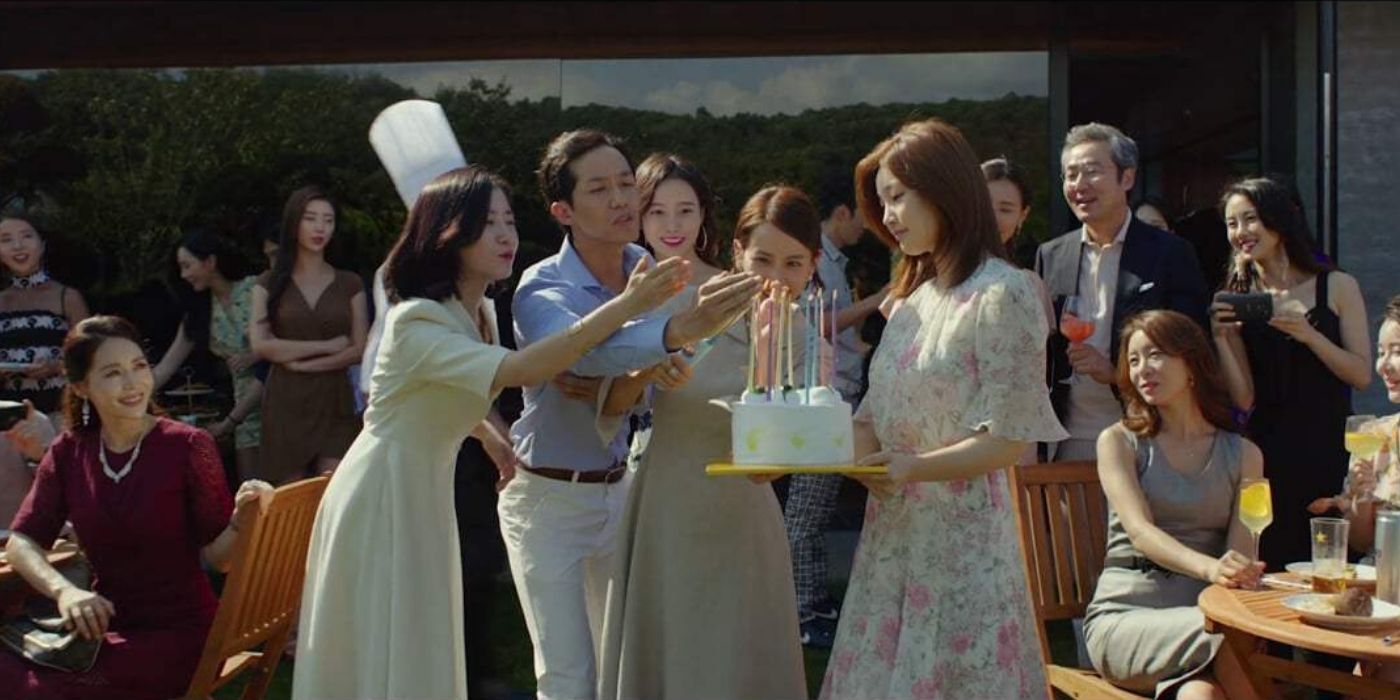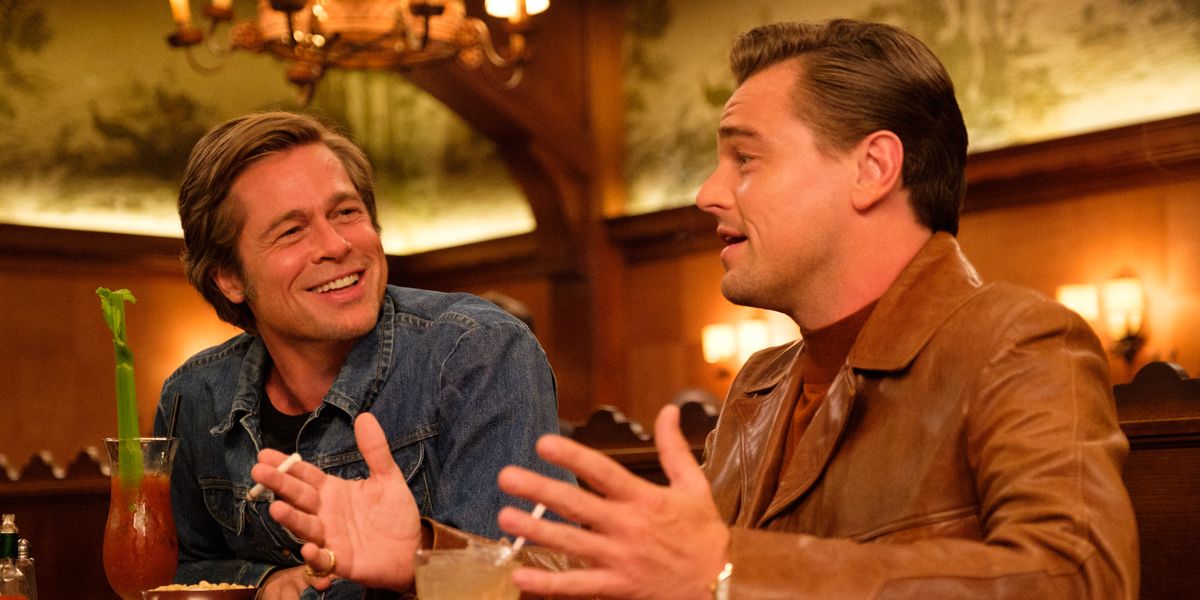WARNING: The following contains major spoilers for Parasite and Once Upon a Time in Hollywood.
On the surface, Oscar nominees Parasite and Once Upon a Time in Hollywood follow a similar story structure. In particular, both films feature sudden, unexpected bursts of violence in their third acts. Yet while they may look alike at first glance, these third-act twists serve very different purposes within their respective stories.
Let’s take a look at what happens during the third act in both films and what those twists mean for the their movies' plots.
Once Upon a Time in Hollywood
After eight previous films, fans pretty much expect director Quentin Tarantino’s movies to feature graphic violence at some point. So although a majority of Once Upon a Time in Hollywood is fairly sedate and leisurely, it seems almost inevitable things are going to change eventually -- especially since the 1960s-set movie includes Sharon Tate and the followers of Charles Manson as characters.
In real life, of course, the Manson Family murdered Tate and several others in her home in 1969. In the movie, however, while the Manson Family members go to Tate’s cul-de-sac with the intention of taking her out, they end up turning their attention to the house next door, which belongs to fading star Rick Dalton, played by Leonardo DiCaprio, after Dalton yells at them to leave the area.
They break in and attack, but Brad Pitt’s Cliff Booth and his loyal dog Brandy are there to go up against the murderously enthusiastic, but not especially prepared, Manson Family. Booth and Brandy kill several of the attackers, but the climax of the violent altercation comes when one of the bloody members of the Manson Family stumbles outside where Dalton is lounging in the pool listening to music. While he was previously oblivious to the chaos happening inside, his response to the trespasser is immediate. He exits the pool and returns with a flamethrower -- a call-back to a prop he once used in a movie he appeared in -- which he uses to brutally put the woman down. The movie ends with Booth being whisked off to the hospital for treatment for his injuries and Dalton scoring an invitation to Tate’s house -- something he’s coveted since she moved in.
Parasite
South Korean director Bong Joon-Ho’s Parasite centers on two families of very different means: the wealthy Parks and the poor Kims. Much of the film revolves around the way the Kims work their way into the lives of the Parks -- and onto their payroll. Soon the Kims have thoroughly embedded themselves into the unsuspecting Parks' lives and forced out their previous chauffeur and housekeeper in the process.
What they don’t know is that the former housekeeper had stashed her husband in a bunker in the basement. No one but the housekeeper is aware of the existence of the bunker, and her husband had stayed hidden there for years to avoid people he owed money to. When she returns one night when the Parks are away to check on her husband, she discovers the Kims’ duplicity and threatens to tell the Parks. An altercation ensues that leads to the former housekeeper’s death.
The following day the Kims attend the Parks’ son’s birthday party. During the soiree, the husband of the previous housekeeper appears. The man is enraged at the Kims because of his wife's death. He runs at the Kims’ teen daughter with a kitchen knife and stabs her in the chest. The well-heeled party guests panic, and in the ensuing pandemonium, the Kim patriarch snaps. He's repeatedly overheard the Park patriarch mock the way he smells, and now he sees an opportunity for revenge. He grabs the knife and stabs Mr. Park, killing him.
To escape the authorities, Mr. Kim takes refuge in the basement bunker where the former housekeeper had kept her husband for so long. He remains there as the movie comes to an end.
What Does It All Mean?
While serious mayhem marks the climax of both of these films, these violent outbursts happen for very different reasons. Once Upon a Time in Hollywood, as the title implies, is a fairy tale vision of an era that’s been lost. In fact, Tate’s murder may have marked the end of those halcyon Hollywood days in the 1960s. One way or another this is Tarantino’s fantasy of that perhaps more innocent time. And to prevent that innocence from dying, he imagines a scenario where Tate’s murder never happens and the Manson family is put down. The sequence in Dalton’s house may be violent, but it’s also pure wish fulfillment.
Parasite’s twist, on the other hand, is the culmination of a class struggle that’s been the focus of the entire film. While the Parks have remained oblivious to the Kims‘ manipulations -- and their plight -- the Kims are hardened by what they need to do to survive. Although the former housekeeper’s husband views Mr. Park as a benefactor who’s (completely unknowingly) sustained him for years, the Kims see him as a means to an end -- and also resent the lengths they must go to just to eke out a meager existence. In the film’s climax, the violence and panic provoked by the former housekeeper’s husband is the catalyst Mr. Kim needs to rise up against Mr. Park, whose attitude towards his smell indicates Park has no clue about the Kims’ struggles.
Thus, while some might describe the violent third-act twist in Parasite as Tarantino-esque, it serves a very different purpose than the violent third-act twist in Once Upon a Time in Hollywood. In Parasite, the twist helps drive home the film’s observations about haves and have-nots. Whereas through Once Upon a Time in Hollywood, Tarantino joyfully revises history, righting past wrongs, if only onscreen.
Written, directed and produced by Quentin Tarantino, Once Upon a Time in Hollywood stars Brad Pitt, Leonardo DiCaprio, Margot Robbie, Bruce Dern, Al Pacino, Tim Roth, Zoe Bell, Michael Madsen, Timothy Olyphant, Damian Lewis, Luke Perry, Emile Hirsch and Dakota Fanning. It is available for digital download, on DVD and Blu-Ray and is still playing in select theaters.
Directed by Bong Joon-ho, Parasite stars Song Kang-ho, Lee Sun-kyun, Cho Yeo-jeong, Choi Woo-shik and Park So-dam. It is available for digital download, on DVD and Blu-Ray and is still playing in select theaters.




